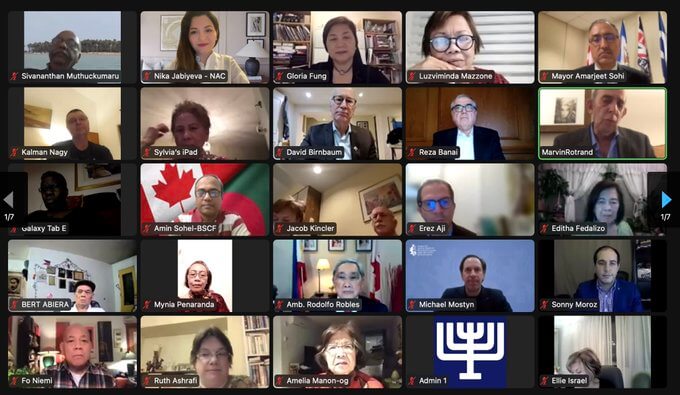Liberal MNA David Birnbaum warned those outside Quebec to temper their criticism of the province’s secularism law, saying that Quebec has “no lessons to learn from other Canadians on racism and antisemitism” during a national forum on combating hate organized by B’nai Brith Canada.
Bill 21, in force since 2019, prohibits public servants deemed to represent state authority, including teachers, from wearing religious symbols on the job.
Birnbaum’s comments followed those by Patrick Brown, mayor of Brampton, Ont., whose council was the first of a growing number of Canadian municipalities to commit financial aid to the legal challenge to Bill 21, and Edmonton Mayor Amarjeet Sohi who denounced the legislation, linking it to attacks on Muslim women in that city.
The three politicians were among about 180 mostly municipal elected officials, cultural community leaders, and human rights activists who participated in the videoconference on Jan. 19, intended to lay the foundation for a multicultural coalition that would pressure Ottawa to strengthen anti-racism legislation.
“United Against Hate,” as the two-and-a-half–hour meeting was dubbed, was convened by Marvin Rotrand, who became national director of B’nai Brith’s League for Human Rights in November after serving 39 years on Montreal city council.
In particular, B’nai Brith is trying to rally broad-based support for the federal government to quickly introduce a successor to Bill C-36 which would have restrained online hate speech. Tabled in June, it died on the order paper after the federal election was called for September.
Asian communities, in particular the Chinese and Filipino, had a strong presence at the forum, expressing alarm over a sharp rise in hate against them since the pandemic.
Birnbaum, who represents the majority-Jewish riding of D’Arcy McGee and is the sole Jewish National Assembly member, is the official opposition critic for Canadian intergovernmental relations.
He said Bill 21 is “a deeply discriminatory law that must be fought,” but urged other Canadians to show “generosity and open-mindedness and to be aware of how Quebec works…
“Your help is more than welcome, but must always be offered with respect and understanding of Quebec’s distinctiveness because that’s how it will best work.”
Sohi, a Liberal MP and cabinet minister from 2015-2019, was elected mayor of Edmonton in October, the first member of a visible minority in that office.
Indian-born and of Sikh heritage, Sohi said among his first priorities was enacting an anti-racism plan and deplored the public attacks on hijab-wearing women in Edmonton.
Bill 21 has had “ramifications felt by communities across the country when people see institutionalized racism promoted… by the state.”
Sohi hopes that an “allyship” is built among different communities so that when one faces racism, others will stand with them.
Brown, whose city is made up of 70 per cent visible minorities, said over 30 municipalities, including Toronto and Calgary, have pledged money for the court case against the bill.
“Religious freedom is a great Canadian value and should never be diminished,” he said.
Bill 21 is now before the Quebec Court of Appeal. In April, a Superior Court judge upheld the law citing its inclusion of the notwithstanding clause which precludes constitutional objections, except for its application to English school boards whose autonomy was established at Confederation.
The Canadian Civil Liberties Association and the National Council of Canadian Muslims are appealing, as is the Quebec government against the English schools’ exemption. The English Montreal School Board (EMSB) is also asking not to be subject to the law until a final judgment.
EMSB commissioner Ellie Israel thanked the cities that are supporting the challenge and urged others to join in “this battle to protect minority rights.”
The national forum followed a similar effort in Quebec initiated by Rotrand, who is drawing on the many connections with diverse communities that he forged over his long political career.
More than 100 organizations and individuals in Quebec signed a letter sent in December to Prime Minister Justin Trudeau and Irwin Cotler, his antisemitism envoy, urging swift action on promises Trudeau made at an international conference on antisemitism held in Malmo, Sweden in October.
Rotrand said he will now draft another letter for the consideration of groups across the country outlining what they want done about hate that reflects their common concerns.
Cotler’s adviser Hannah Marazzi spoke at the forum without directly referring to the initial letter or Bill 21. Cotler recently criticized the law as breaching both the federal and Quebec rights charters.
“It does not so much separate religion and state as it authorizes state interference in religion,” said Cotler, a former justice minister and attorney general.
Three members of the Muslim community spoke at the forum: Reza Banai of Justice 88, which opposes Iran’s Islamic regime; Nika Jabiyeva, executive director of the Network of Azerbaijani Canadians; and Bashir Hussain, director of the Council of South Asian Communities.
“It’s not for Jews alone to fight antisemitism, or for Muslims alone to fight Islamophobia,” Hussain stated.
Rotrand agreed: “When one group is attacked, we all have an obligation to speak out.”







